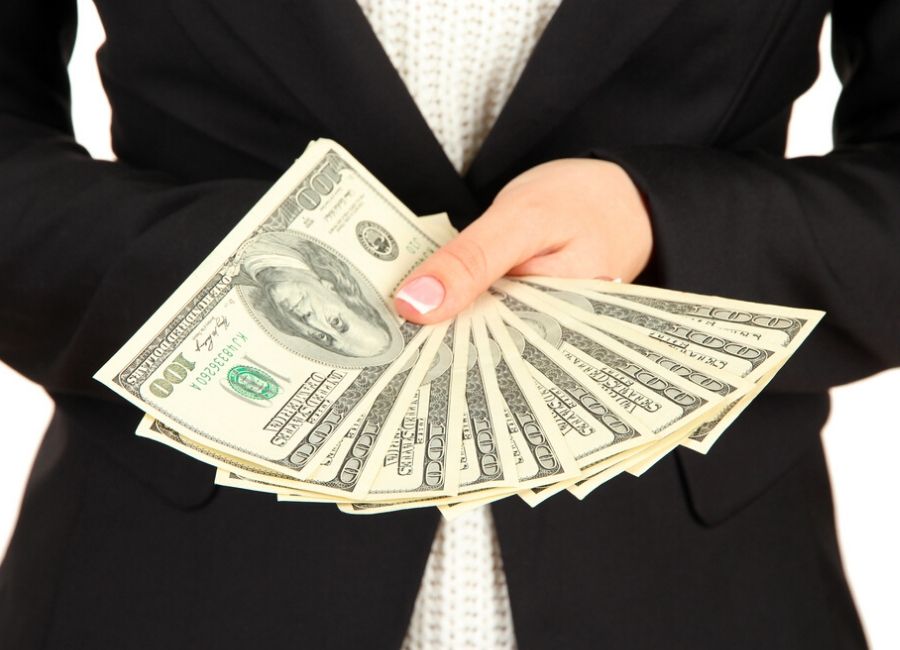One of the most common questions I get as a budgeting coach is if people should save money when they have debt. There is no “one size fits all” answer. Every person’s situation is different. One person may be able to afford to save and pay off debt, while another person may not be able to. While I can’t give a specific answer, I can help you think through your situation and answer the question yourself! Keep reading to determine if you should save money when you have debt.
What does your budget tell you?
Before you can answer the question of saving when you have debt, you’ll need a clear understanding of your budget. As you know, your budget lays out your income for the month, your spending for the month, and what should be left over.
Look at where your income is currently being allocated to. Where is your money currently going? Are there any expenses you don’t really need? Are there any areas you can reduce spending in? Once you know this information, you’ll be able to determine how much profit you have left over.
That profit is what can be used for savings or debt repayment. How much are you working with? Do you have enough to save and pay off debt? Even if it’s a small amount being saved, something is better than nothing. The rest should be used to pay off your debt. Debt should be temporary. Once it’s paid, it’s done with.
How much is your debt costing you?
When thinking about paying off your debt, it’s critical to understand how much debt you have and what it’s costing you month over month. Make a list of all your debts. Include the total balance, the minimum monthly payment and the interest rate you’re being charged.
Review past statements to see exactly how much interest you are being charged on each of your debts. Paying the minimum means you are covering the interest month over month and, if you’re lucky, some principal. When you start paying more than the minimum, you start tackling that principal. The principal balance is what determines how much interest you’re charged.
Sometimes, we need to see exactly how much we’re being charged in interest to answer the question of if we should save and pay off debt at the same time. It may make more financial sense to pay off your debts before saving, because of how much those debts are actually costing you.
Do you have any form of savings right now?
If an emergency came up, how would you pay for it? Just because we focus all of our efforts on paying off debt does not mean that something can’t come up. You don’t want to be in a position where you need to debt to pay for an emergency or unexpected expense.
Because of this, it’s wise to have something saved up before aggressively paying off your debt. Dave Ramsey recommends $1,000. I don’t necessarily agree. I think every person’s situation warrants a different savings amount. If you don’t have large expenses, or you have help if you need it, start with a $500 savings.
If you have responsibilities (think kids or mortgage) and no one to help if you need it, maybe you’ll want closer to $1,500 saved. Everyone’s situation will look different, so think about a number that feels good for you. Unplanned expenses are inevitable and the goal is to make sure you don’t use credit to help pay for them.
If you don’t have anything saved, that should be your first goal, before aggressive debt pay-off. If you have something saved, then focus on paying off your debt. If you can afford to keep saving and pay off your debt, do both. It’s all about finding what’s best for your situation and sticking to that.
If you need guidance or want an opinion on your specific situation, request a call with me and let’s talk through it together!
Related: 5 Signs You Shouldn’t Be as Broke as You Are
When thinking about if you should save and pay off debt, it all comes down to what you can afford. If you can’t afford an emergency, then you absolutely should save. If you have savings already, then you can’t afford the interest on your debt and should focus your efforts there.
Again, there’s no one size fits all. You have to put yourself in the best position to be successful. Thinking about your situation, what makes the most sense for you? Should you be saving and paying off debt at the same time? Comment below to share what you’re currently focused on with your finances!





